- Home
- Ninie Hammon
Blue Tears
Blue Tears Read online
Blue Tears
Through The Canvas: Book Four
Ninie Hammon
Copyright © 2020 by Sterling & Stone
All rights reserved.
No part of this book may be reproduced in any form or by any electronic or mechanical means, including information storage and retrieval systems, without written permission from the author, except for the use of brief quotations in a book review.
The authors greatly appreciate you taking the time to read our work. Please consider leaving a review wherever you bought the book, or telling your friends about it, to help us spread the word.
Thank you for supporting our work.
Contents
Chapter 1
Chapter 2
Chapter 3
Chapter 4
Chapter 5
Chapter 6
Chapter 7
Chapter 8
Chapter 9
Chapter 10
Chapter 11
Chapter 12
Chapter 13
Chapter 14
Chapter 15
Chapter 16
Chapter 17
Chapter 18
Chapter 19
Chapter 20
Chapter 21
Chapter 22
Chapter 23
Chapter 24
Chapter 25
Chapter 26
Chapter 27
Chapter 28
Chapter 29
Chapter 30
Chapter 31
Chapter 32
Chapter 33
Chapter 34
Chapter 35
Chapter 36
Chapter 37
Chapter 38
Chapter 39
Chapter 40
Chapter 41
Chapter 42
Chapter 43
Chapter 44
Chapter 45
Chapter 46
Chapter 47
Chapter 48
Chapter 49
Chapter 50
Chapter 51
Chapter 52
Chapter 53
Chapter 54
Chapter 55
Chapter 56
Chapter 57
Chapter 58
Chapter 59
Chapter 60
Chapter 61
Chapter 62
Chapter 63
Chapter 64
Chapter 65
Chapter 66
A Special Request
Ready for more Ninie Hammon?
Also By Ninie Hammon
About the Author
Chapter One
“I don’t mean to rain on your parade,” T.J. told Bailey, and she could see he was trying to say it in the kindest way possible. “But you figure that federal marshal fella’s gonna be in his office today, it being Thanksgiving and all?”
She hadn’t even thought of that.
As soon as she got over the shock of seeing the man who had murdered her husband standing in the background of the photo she, Brice, T.J. and Dobbs had taken at the Nautilus Casino the night of her birthday party, her brain had likely had only one or two synapses still firing.
Mikhailov was the reason she was in the Witness Protection Program, the reason she’d been shipped all over the country, the reason she had given up her little girl. The police had stashed her away until they could arrest the mafia boss and lock him up, said her life and the lives of everyone she cared about would be in jeopardy if he knew that the woman he’d killed along with Aaron — and then made it look like they’d both been killed in a car wreck — was actually a homeless woman they’d stopped to pick up off the side of the road in the rain.
Mikhailov thought Bailey was dead. But she was alive, thank you very much, ready to leap out of the shadows and testify against him as soon as they served the sealed indictments.
But Mikhailov vanished before they could put the cuffs on him. Returned to Russia. Left Bailey in Witness Protection Program limbo, unable to reclaim the life he’d stolen from her. She believed he still was in Russia. Apparently, the police did, too. And she’d have gone right on believing it if he hadn’t decided to show up at the Nautilus Casino while she was there with her friends celebrating her birthday.
They’d caught his image in the background of their grinning group picture.
As soon as the implications of that sunk in — he was here in this country, they could lock him up and she could get her daughter back! — she’d reached for her phone to call her federal marshal contact in the WITSEC program and tell him.
That’s when T.J. pointed out that it was Thanksgiving Day. The guy might not be in.
“Then I’ll call his cellphone. And if that doesn’t work, I’ll call him at home.”
Bailey’s hands were trembling when she pulled up the emergency call list on her phone. She hadn’t set it up, of course. Hadn’t picked out or purchased the phone either. Things like that — her name, the city where she was parked until the mythical “soon” which never came, or the middle-of-the-night visits from the U.S. Marshal’s Service to whisk her away into the darkness — she was only on the receiving end of such things. She didn’t get to decide.
The day U.S. Marshal Bernard Jordan — probably Bernie to his friends, if he had any friends — had given her the phone, his face had been as expressionless as an eggplant.
“My office, my home and my cell numbers,” he’d said, when he’d programmed it for her. “They’re all on the ‘emergency call list’ in this phone.”
Perhaps she was supposed to feel grateful that he’d given her all three numbers. Maybe she was supposed to feel safe and well-cared-for since she could reach Marshal Jordan no matter where he happened to be.
But at the time she’d felt neither safe nor well-cared-for. She had felt as desolate as barren wasteland a hundred thousand years removed from the ocean floor it had once been.
She punched in his office number first — just in case he’d decided to work on the holiday. But when she was sent to voicemail, she hung up. This was not a message she intended to communicate with a recording.
Home or cell?
Cell seemed less intrusive. He could be anywhere — at a crime scene, or in his car. Home conjured up images of a man watching the Cowboys play the Panthers, sitting on the couch in his underwear, and she didn’t like that visual.
He picked up after the first ring.
“Marshal Jordan.”
Bailey was momentarily speechless, had no idea how to convey the enormity of what she had discovered, a life-changing occurrence, the end of “soon” and the beginning of “now.”
Her life back.
Her little girl!
“This is Jessie Cunningham.” The name, her real name, came out effortlessly. She’d only spoken it aloud a handful of times since her name had been taken away from her along with her husband, her child and her life. And one of those times had been when she’d blurted it out to T.J. the first day she met him, the day she’d put Oscar in her skull even after T.J. had pleaded with her not to.
She shot him a glance.
The old man was seated in the same spot he’d been that night. The image of him in the lantern light, with Sparky beside him soaking the couch with his wet fur flashed like a comet across her mind and was gone. He smiled what she was sure he meant to be an encouraging smile, but it hung on his face as limp as a surgeon’s mask.
“I saw him! He’s here. He’s back.”
If the federal marshal asked “he who?” Bailey would somehow reach into the telephone and rip his throat out.
“Mikhailov? Where did you see him?”
“At the Nautilus Casino.”
“A casino — figures.”
“He’s standing in the background of a picture that was taken
Halloween night.”
“And you’re just getting around to telling me about it.”
“I’ve been busy!” she snapped.
She’d been recovering from near drowning in a flooded coal mine with half a dozen girls kidnapped by an international sex slave ring. But she couldn’t tell him that. Because he’d ask how she’d gotten mixed up in a thing like that and the explanation wasn’t one a man like Jordan would ever believe.
“I didn’t see the picture until just a few minutes ago. It’s him in the background. I’m positive. Pointed beard. Eyepatch.” Her arms broke out in sudden gooseflesh. “I will never forget that face.”
“All right then. I’m on it. I’ll start lifting up rocks, see which one he’s crawled under.”
Bailey couldn’t have said what she’d expected, but that response clearly wasn’t it.
“That’s all? You’ll go ‘looking for’ him? Hope he turns up somewhere before he decides to spend another two years in Russia?”
“I know how you must feel, Mrs. Cunningham.” Oh, how Bailey hated it when someone told her they knew how she felt. “We want this guy — bad. He’s left a trail of dead bodies dating back thirty years and this is the first time we’ve had a shot at making a charge stick. We’ll pull out all the stops on this one.”
That made her feel better.
“So when can I—?”
“You stay right where you are! Don’t say anything to anybody. You’re only alive because Mikhailov thinks you’re dead, and you’ll be dead if he finds out you’re alive.”
Bailey wondered if he realized how convoluted that sounded, but she got the message.
“You’ve hung in there this long. Don’t blow it all now. Let us find him, arrest him and then you come out of hiding.”
“All right.” She couldn’t help the disappointment in her voice. But what had she expected — that she’d call the marshal and he’d go out and arrest Mikhailov before dinnertime so she could have her life back by tomorrow morning? Yeah, she kinda had. “I will remain a good little WITSEC bobblehead doll.”
The marshal made some kind of grunting sound that might have been a surprised laugh. “You do that.”
“But you’ll call me, let me know what’s going on, right?”
“I’ll keep you informed.”
Now was that natural place in the rhythm of a conversation where he said goodbye and hung up. But he didn’t.
“So … how have you been?”
Bailey was struck momentarily speechless by the non sequitur.
He sounded like he was her college roommate, had bumped grocery carts with her in the produce section and was trying not to look surprised that she’d gotten fat.
She opened her mouth to say, “Oh, fine. And you?” but could not shove the inane words out past her lips.
The federal marshal had no idea what she’d been through since she moved to Shadow Rock, West Virginia. He knew nothing about her suicide attempt, about Oscar, or her special “gift.”
Or where that gift had sent her. Then she realized he’d asked the question because he had somehow sensed that she was no longer the pathetic, devastated woman he’d parked in a rental house in Albuquerque almost two years ago.
“I’ve been through hell in a dinghy, Marshal Jordan. If what doesn’t destroy you makes you stronger, I’m ready to bench press a Hummer. I want my life back!”
She meant to say the rest just as forcefully, but all of a sudden she had only enough air to whisper, “I want my daughter back.” The steel came back into her voice for the rest, though. “I am counting on you to make that happen.”
“Yes ma’am.” He said nothing more. Just hung up.
Chapter Two
You coulda heard a gnat tiptoeing ‘cross a cotton ball in that room after Bailey ended the call to the federal marshal. The enormity of what had happened, how the world had shifted under Bailey’s feet, must have left her reeling.
It’d left him and Dobbs and Brice knocked on they keisters, too. Yeah, they’d suspected that Bailey was in the Witness Protection Program ever since the afternoon T.J. had met her and she’d introduced herself as Jessie Cunningham, and then all her identification said she was somebody else entirely. A thing like that wasn’t no accident. Other things, too — the way she looked so lost and desolate whenever she seen a child, ‘specially a little girl, broke T.J.’s heart. The longing he could see in her eyes, the mama longing. The way she never wanted to talk about her past, likely ‘cause she was afraid she’d forget key details of it, since the whole thing was made up.
They’d all known she’d tell ‘em the truth when she was ready to do it. So they didn’t ask, didn’t pry. Still, wasn’t a one among ‘em expected the whole thing’d come out all at once, like the foul stuff in a boil when you burst it. She seen that guy with the eyepatch in the background of the picture, and her world literally changed in an instant.
“You look like a woman who could use a drink.” Brice managed to keep his voice easy and conversational. He was good at that stuff, being the sheriff and all. Course T.J. knew his insides had got to be tangled like last year’s Christmas lights.
She turned to him, looked at him but didn’t really, then focused and she come back from wherever it was she’d gone, and the energy whooshed out of her.
“Make it a strong one, like strong enough to dissolve the swizzle stick.” She sank down into a chair as she spoke, and T.J. seen that her hands holding that phone was still shakin’.
“Wine’ll have to do,” Dobbs said, turning toward the kitchen to fetch it. “Unless you’ve got a bottle of hard liquor stashed away you’ve been taking nips out of without telling us.”
“Wine it is,” she said.
“On your way in there, turn off that TV. Ain’t nobody much interested in the Cowboys anymore.”
They’d been preparing to watch the Cowboys play the Carolina Panthers when Dobbs had whipped out the picture that changed the world. Bailey didn’t care nothing about the game. She was a Pittsburgh Steelers fan, said she bled gold, and that might just be one of the things T.J. liked best about her, that she had good taste in football teams.
It was quiet when Dobbs left, the sound of the distant football game cut off in mid-cheer. They’s each thinking they own thoughts, but T.J.’s mind had been runnin’ way out there in front of his headlights and he was sure Brice’s was, too. As he had commented on more than one occasion, you don’t get put in Witness Protection for seeing somebody cheat in a chocolate chip cookie bake-off. Even so, the revelation that the folks who wanted her dead was Russian mafia, was a conversation stopper. T.J. didn’t have to ask to know that Brice was thinking the same thing he was, tryin’ to figure how they could help Bailey stay alive long enough to testify.
Right now, the girl was wound tighter’n one of them wires on a piano that play the high notes.
“Feel like talkin’, do you? If you don’t, that’s alright, too, but you gotta figure we got lots of questions about all this.”
“Don’t feel like you have to—” Brice began.
“No, it’s alright. I owe you guys … all the times I’ve had to … make stuff up, shade reality …”
Brice tried to protest but she waved him off.
“I owe you guys the truth. But more than that, I want to tell.”
T.J. seen the coiled spring in her begin to relax just a little. When she set the cellphone down on the table, her hands had just about stopped trembling.
“I want to talk about … it’s been years since … there hasn’t been anybody … I don’t know where to start.”
“The thing that most interests me,” Dobbs said as he returned with a glass of wine and handed it to Bailey, “is that little girl of yours. Where has she been all this time? Who’s been looking after her?”
Bailey’s face hardened a little.
“I’ll tell you who hasn’t been looking after her — Claudia and Drayton Cunningham, Aaron’s parents.” The briefest smile caressed her lips, then was gon
e. “He called them Cruella and Dracula. As soon as I met them …” She shrugged.
“Spot on?” Dobbs offered. “The Brits have a way of nailing a phrase.”
“Yeah. Monsters in human being suits … no, that’s not fair. A monster is a proactive creature and they weren’t that. They were just spoiled and narcissistic, born of privilege, flicked their genealogical ashes all over the peons — that would be me, by the way — who couldn’t trace their ancestry back to Charlemagne. She’s addicted to prescription pain meds, he’s either senile or has dementia or Alzheimer’s or something. That last Christmas—”
You could see how just them words — the last Christmas — took her breath away.
“We went to their house for a get-together. It was awful. Both of them barely functional, his brothers and their wives trying to put a good face on it. It was the memory of that Christmas that caused my Meltdown in Memphis.”
Dobbs settled himself back into the big, overstuffed chair next to the couch. “There has to be a story there.”
Bailey reached down and scooped Bundy — an acronym for Bailey’s Un-Named Dog — off the floor into her lap and petted him as she described how she’d been — she called it “interrogated” but he suspected it’d only seemed like that when you was on the receiving end — by the police, told she had to leave her whole life behind, stuffed into a car and hauled off to Albuquerque.

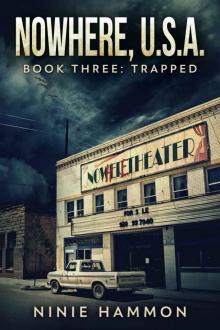 Trapped (Nowhere, USA Book 3)
Trapped (Nowhere, USA Book 3)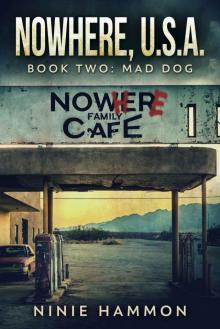 Mad Dog (Nowhere, USA Book 2)
Mad Dog (Nowhere, USA Book 2) Black Water
Black Water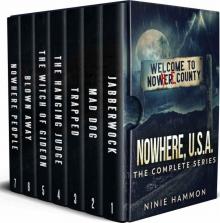 Nowhere USA: The Complete Series: A Psychological Thriller series (Nowhere, USA)
Nowhere USA: The Complete Series: A Psychological Thriller series (Nowhere, USA)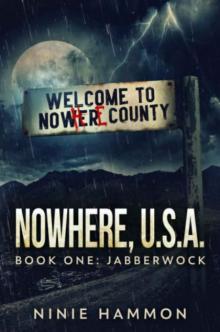 The Jabberwock
The Jabberwock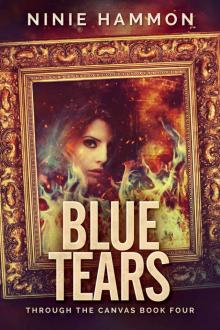 Blue Tears
Blue Tears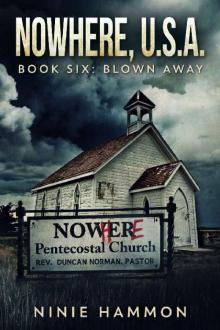 Blown Away (Nowhere, USA Book 6)
Blown Away (Nowhere, USA Book 6)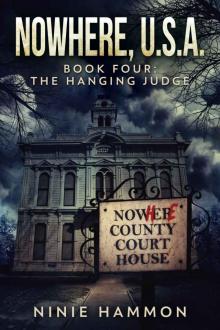 The Hanging Judge (Nowhere, USA Book 4)
The Hanging Judge (Nowhere, USA Book 4)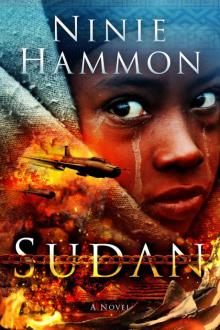 Sudan: A Novel
Sudan: A Novel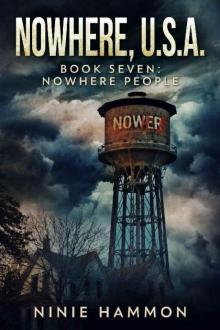 Nowhere People (Nowhere, USA Book 7)
Nowhere People (Nowhere, USA Book 7)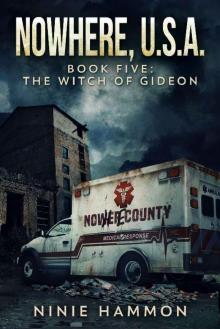 The Witch of Gideon (Nowhere, USA Book 5)
The Witch of Gideon (Nowhere, USA Book 5)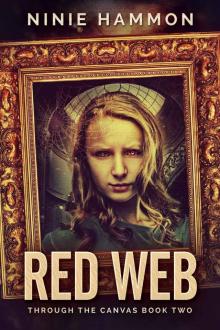 Red Web
Red Web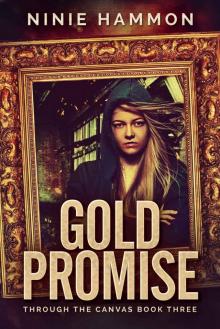 Gold Promise
Gold Promise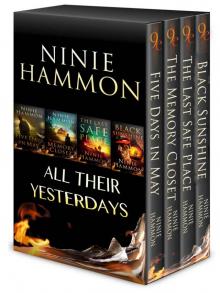 All Their Yesterdays
All Their Yesterdays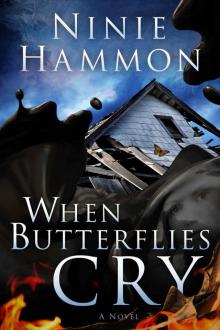 When Butterflies Cry: A Novel
When Butterflies Cry: A Novel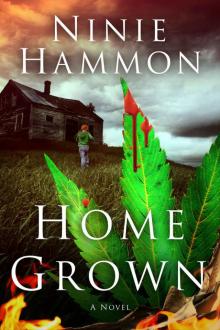 Home Grown: A Novel
Home Grown: A Novel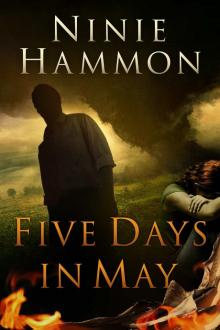 Five Days in May
Five Days in May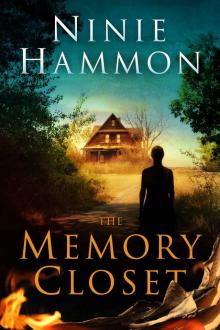 The Memory Closet
The Memory Closet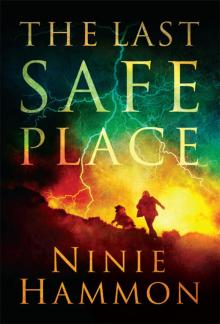 The Last Safe Place
The Last Safe Place The Knowing Box Set EXTENDED EDITION: Exclusive New Material
The Knowing Box Set EXTENDED EDITION: Exclusive New Material